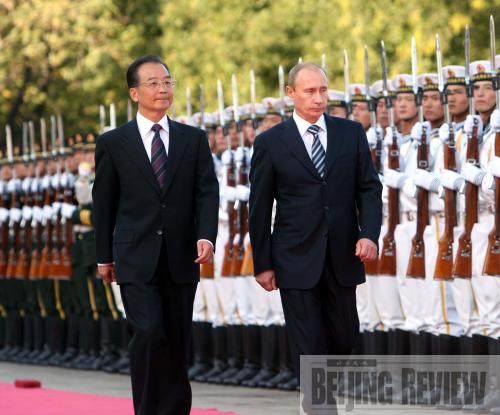|
 |
|
WELCOME CEREMONY: Chinese Premier Wen Jiabao welcomes Russian Prime Minister Vladimir Putin to China on October 13 in Beijing (LIU WEIBING) |
As the two largest countries on the Eurasian Continent, China and Russia have established stable and coordinated relations through bilateral and multilateral cooperation. In particular, growing trade and economic cooperation have promoted the two nations' overall relations to a higher level in recent years.
In mid-October, Russian Prime Minister Vladimir Putin paid an official visit to China at Chinese Premier Wen Jiabao's invitation—his first since taking office in May 2008. During the 14th regular meeting between Chinese and Russian prime ministers held in Beijing on October 13, the two sides reached a series of important common understandings before signing a joint communiqué.
The annual prime ministers' meeting system, established in April 1996, has been an important platform for the government heads of the two sides to exchange ideas on their countries' bilateral relationship and world events of mutual concern.
In addition, the two countries signed a number of documents, including a framework agreement on Russia's export of natural gas to China, a memorandum of understanding on developing high-speed rail transportation in Russia and an agreement on mutual notification of the launches of ballistic missiles and carrier rockets.
They also reached a consensus on customs clearance and quality guarantees in a bid to jointly settle the "gray customs clearance" issue, one that had displaced Chinese merchants in Russia. Statistics show these bilateral business agreements have a value of more than $4 billion.
Meanwhile, the two prime ministers agreed to develop cultural and social exchanges between peoples, which are expected to serve as cement for bilateral ties.
When meeting Putin on October 14, Chinese President Hu Jintao stressed the two countries have offered mutual support on issues concerning core interests and cooperated on international and regional affairs.
"China would like to work more closely with Russia to enhance political trust and strategic coordination," Hu said.
In separate remarks, Putin echoed that his visit had marked an "important step forward" in bilateral cooperation.
Significant agreements
The newly signed agreement on mutual notification of ballistic missile and carrier rocket launches, for example, was one dramatic signal of a greatly improved political and military trust between China and Russia.
Such a notification mechanism is not only brand-new to China and Russia, but also very rare elsewhere in the world. Such a mechanism can only be set up between countries fully confident in each other's defense systems. This is because a country's ballistic missile launch data are extremely sensitive and, if caught by a hostile power, could lead to the interception and neutralization of its missiles.
Previously, China and Moscow enjoyed an agreement on launch information sharing of short-range missiles along their border regions. The newly signed accord marks a true breakthrough in bilateral relations.
The oil pipeline between the two nations currently under construction—running from Skovorodino, Russia, to China's northeastern city of Daqing—could be completed by the end of 2010 and begin supplying oil in 2011, according to an agreement reached during Putin's visit. The Chinese side, meanwhile, is considering building a refinery plant along the border area.
In February 2009, Russia agreed to export crude oil for the next 20 years for a loan of $25 billion. Now the two sides are working on the 2,000-km-long pipeline.
The two countries also decided to launch the west and east lines of the gas project simultaneously in a bid to start supplying gas between 2014 and 2015. The annual natural gas export volume might be 70 billion cubic meters, according to the Russian Government.
Currently, Russia's railway network remains based on the Soviet Union's infrastructure, with outdated technology used support a high-speed railway system.
China offers a far different model than Russia. Compared with other countries that have mastered high-speed rail technologies such as Japan and Germany, China has not only mastered all the technologies needed, including engineering, telecommunication, energy supply and carriage building, but also has experience in building high-speed railways over wide ranges of land.
Perhaps more attractive is the fact that Chinese railways offer a cost that is some 20 percent lower than that of other countries. The possibility of introducing China's high-speed rail technology and infrastructure is a win-win outcome to both sides. To Russia, it can attain Chinese technology, capital and labor to promote its domestic economy. For China, the opportunity to conduct foreign investment as well as advertising for "made in China" would surely be invaluable.
All-round exchanges
Cultural and social exchanges have been absolutely necessary foundations for establishing mutual trust in Sino-Russian relations. During the Year of Russia in China and Year of China in Russia in 2006 to 2007, the two sides jointly held more than 600 events.
| 